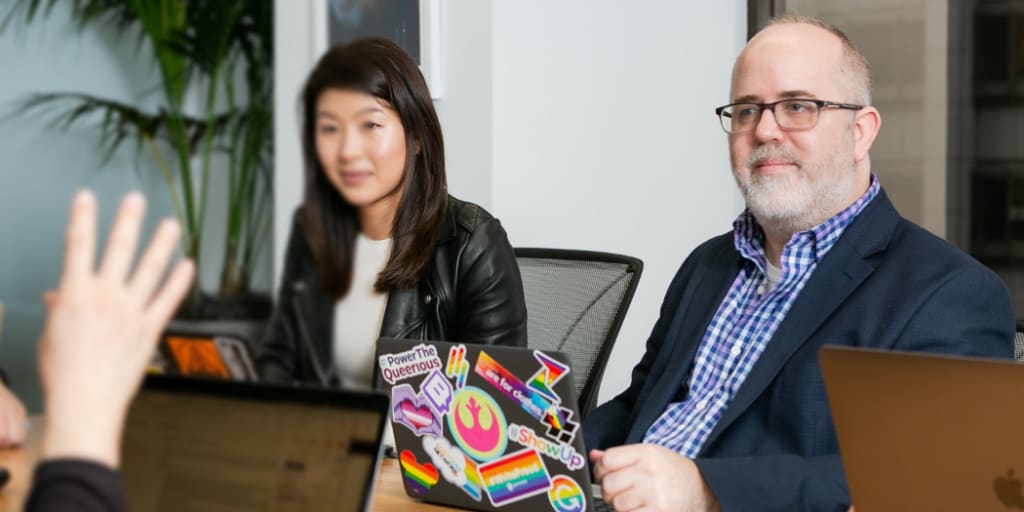We Shouldn't Care If Someone's "Faking" Being Queer For Attention
So what if people are "pretending" to be gay or trans?

There is this odd narrative that gay, bi, and trans people are just being queer for attention. For the past couple of years, there has been a lot of discourse around the concept of "transtrenders" (i.e., people who allegedly aren't "real" trans individuals and are just identifying as such for attention). Before this, countless straight people claimed this same thing for gay and bi people. We were "just being dramatic" or "going through a phase."
Over the years, many activists have tried to refute these points by citing the obvious fact that most people do not want to take on more stigma and discrimination for Internet clout. It's not a formula that makes much sense. If you wanted to get a lot of attention with little risk, I'd recommend being a conservative. It certainly pays better.
Yet I think that these dismissals miss the point. The arguments these conservatives are making have nothing to do with the facts but are instead about trivializing people's identities so they can be dismissed. Arguing against these points does nothing more than validate a conservative's transphobia on their own terms when it's they who must defend their nonsense points.
We do not need to defend the claim that we are "not being queer for attention" because there's nothing terrible about identifying as queer for any reason. Turn the argument around and ask yourself, what is so bad about being queer for clout?
Asking the straights
This is the question these critics never have a good answer for, and it's peculiar because it's their whole thesis. Even if you are actively anti-LGBT — the entire concept of queer people being happy just actively enrages you — what exactly do you think will happen if someone chooses to be queer for attention?
It can't be about procreation. Most queer people are not, in fact, gay but bisexual, which means that many of them will continue to reproduce in the same way straight people reproduce. There are plenty of bi people in a monogamous relationship between a cis man and a cis woman, producing children the "natural" way. There are also plenty of trans people giving birth the "natural" way as well. Not to mention all the queer people adopting children that straight, cisgender society has abandoned.
This claim that we shouldn't be queer for attention has nothing to do with our species' survival. In fact, if we are being technical, even if our civilization became predominantly gay, that doesn't mean we would stop producing children. We know this because it doesn't happen in the animal Kingdom among the queerest of animals.
For example, Giraffe males overwhelmingly have more homosexual sex than heterosexual sex. However, their species still continues on because, contrary to popular opinion, having same-sex sexual activity doesn't prevent you from having opposite-sex sexual activity. You can stick your dick in a dude one today, a woman the next, and an enby the following one, and this sex doesn't invalidate your ability to produce a child. You only need one sperm to make its journey to the egg one time to have a kid.
So I ask again, what is so terrible with being queer for attention? Will a bomb go off that I don't know about?
Every time people talk about the problem with people "choosing" to be queer, they always bring up concepts like "the family" or "marriage," but that's just word salad. These are institutions we as humans made up, and they have changed dramatically across time and space. A 7th-century Greecian marriage was nothing like a marriage today. Neither were the robust family structures of ancient hunter-gatherers like the 1950 nuclear family.
If your argument is that something is wrong because it has changed, then you could make the same case against straight people (see Debating the Morality of Heterosexuality). Heterosexuality as an identity is relatively very recent. It came into being in the 1860s, with the previous focus being on sexual activity rather than sexuality as an identity. It took a while for heterosexuality to have its current meaning. As recently as 1923, Merriam Webster's dictionary defined heterosexuality as "morbid sexual passion for one of the opposite sex."
Since the current framing of heterosexuality has been mass adopted in our society, few have argued that its invention was dangerous to the relationship structures that preceded it. Yet under the logic that reactionaries are espousing, you can assert the same question here. Heterosexuality was considered morbid and degenerate at one time. Were these straight people choosing to be heterosexual for attention? Didn't people "choosing to be straight" undermine the way previous family and marriage structures worked?
Because apparently, being popular and different makes your lifestyle wrong, for some reason.
Asking the queers
This argument makes even less sense from someone who claims to support queer rights. From my perspective as someone who advocates for queer liberation, if more and more people decide to be queer, assuming that is something someone can "decide," then isn't that a good thing?
It means that the world is safe enough for there to be genuine social benefits to being queer, and that sure as hell beats the discrimination and hatred that used to be the norm (and for many still is). It ultimately would be a good thing that someone would feel like they could not only gain acceptance as a queer person but that queerness could bring them prestige. If you support queer rights, what is the drawback of queerness conferring social benefits? Isn't part of the goal of liberation being able to accrue more power for your community?
There are many "concerned" queer people out there who think that all of these trendy gays and trans people are giving the "rest of us" a bad name because, well, there usually isn't much of an explanation given besides just that it's terrible. When you prod, the argument seems to come down to non-queer people judging queer influencers and then taking away all queer people's rights in the process. As Conservative Trans YouTuber Blaire White remarked in 2020:
“[There] are people who appropriate being trans for attention. You can act like they don’t exist. [But] they do….I feel like the existence of gender dysphoria validates trans people on a scientific level and [allows] other people to see that its not really a choice that we feel or behave this way….I feel like [appropriating transness] deeply contributes to the fact that LGBT acceptance has been going down for the first time in decades.”
Firstly, the problem with this argument that "changing the definition of queerness" is causing straight people to hate us is that straight people, by and large, don't hate us. Polling shows high support among the American public for things like same-sex marriage, same-sex sex, and trans people serving in the military. Blaire and others are confusing our oligarchy's ability to pass laws with the opinions of the public as a whole.
This argument also ignores that many people are initially afraid to openly identify as queer because of stigma, so they instead use irony and deflection as a defense mechanism. The appropriation argument doesn't work because queerness isn't like race. It's an internal identity. There have been plenty of "ironic" queers who turn out to openly identify as queer years later after they have become more comfortable with themselves. There is truthfully no way to tell the difference between a "fake" queer and a repressed queer, and this gatekeeping pushes the latter deeper into the closet.
Yet even if someone is indeed being a troll by "falsely" identifying as queer, why should I care?
Going back to the years when most straight people in the US did actually hate queer people, it's not exactly like they were rolling out the red carpet for us. Decades of silence did not lead to liberation but perpetuated the oppressive status quo. There is a rich history of queer people (and indeed many oppressed identities) attempting respectability politics in the hopes that it will convince straight, white racist, patriarchal society to treat us all better, only for the opposite to happen. Famously the Mattachine Society, still raw from events like the Lavender Scare, often operated in secret. It self-policed its members and demanded things such as dressing in formal attire for demonstrations. Tactics that were not very successful.
Only when organizers started becoming more confrontational with the pride riot of 1969 (spearheaded by femme, queer people of color) did history begin to move in a more positive direction. As the infamous saying goes, "pride started as a riot." Many of the most successful queer movements have relied on direct confrontation, often invading the personal spaces of politicians, journalists, and other public figures.
If you are the type of queer person who thinks that respectability politics will lead to greater acceptance, history does not support you on this matter. You may think homophobic or transphobic people will spare you from discrimination because you are "one of the good ones" and doing things "the right way," but that strategy has never worked for our community before.
Just look at Milo Yiannopoulos and Dave Rubin. After years of building up conservative goodwill, their audiences have quickly turned on them for being "degenerates." Milo has since renounced his sexuality, and Dave Rubin was hounded by "fans" for starting a family with his husband.
None of us are immune from that kind of backlash.
Asking everybody
These arguments are not rooted in actual logic but emotion. Bigots are worried about everyone becoming queer because they just hate queer people. We are icky to them, and moral panic allows them to discriminate against us, or in the case of self-hating queer people, to fuel their resentment of "non-normative" queers rejecting the more repressive paths they had to go through.
Yet this emotional reality doesn't mean we should consider their arguments seriously. Rather than painstakingly dispute the question of whether "queers are choosing to be queer for attention," we should treat these illogical positions as illogical and place conservatives on the defensive instead.
What's the big deal if someone decides to be queer for Internet points?
Because I cannot think of a reason that merits actual consideration, go ahead; I'm waiting.
About the Creator
Alex Mell-Taylor
I write long-form pieces on timely themes inside entertainment, pop culture, video games, gender, sexuality, race and politics. My writing currently reaches a growing audience of over 10,000 people every month across various publications.
Enjoyed the story? Support the Creator.
Subscribe for free to receive all their stories in your feed. You could also pledge your support or give them a one-off tip, letting them know you appreciate their work.






Comments
There are no comments for this story
Be the first to respond and start the conversation.